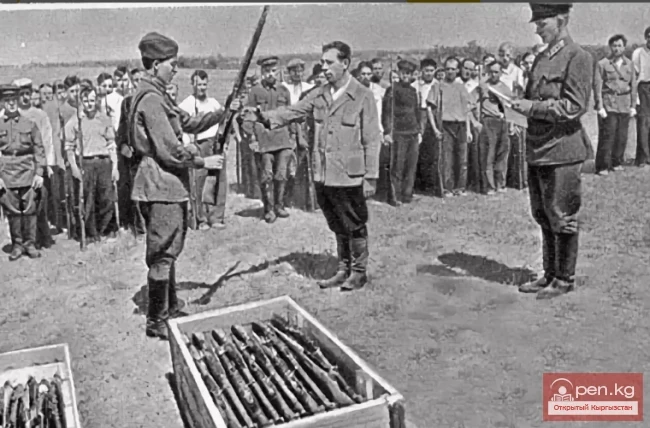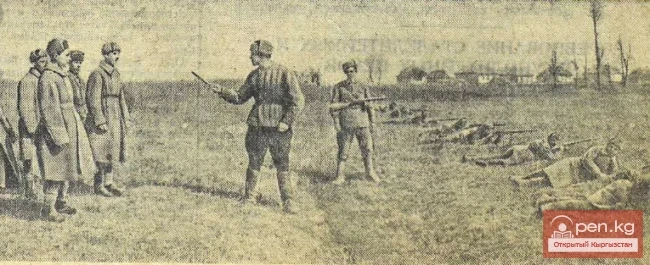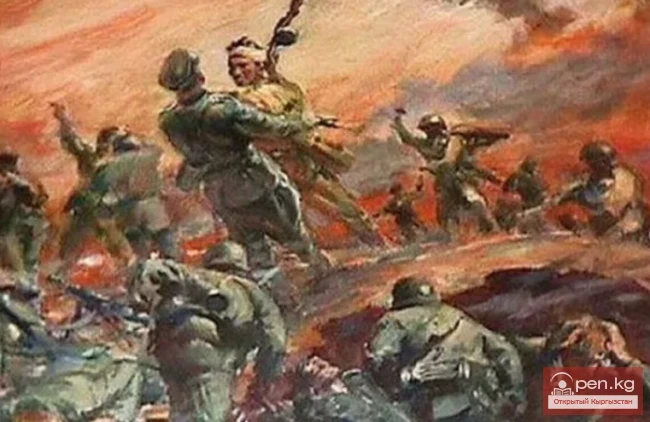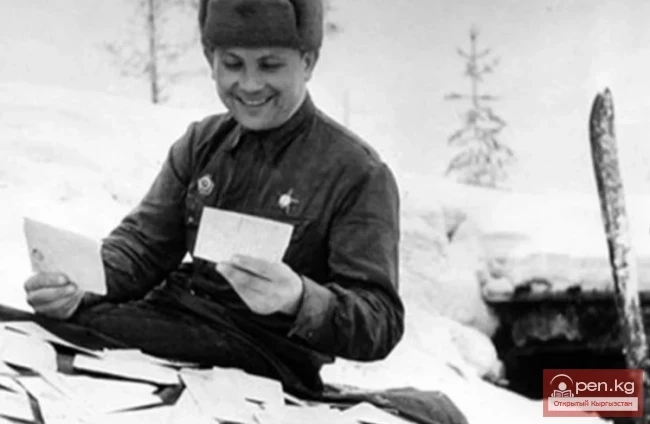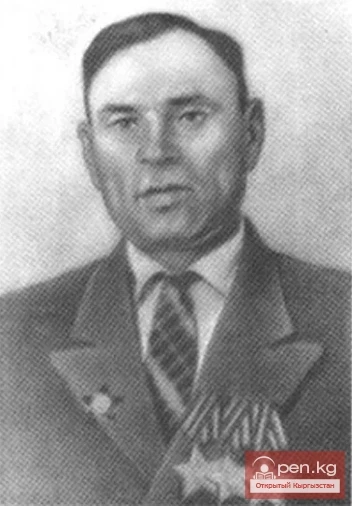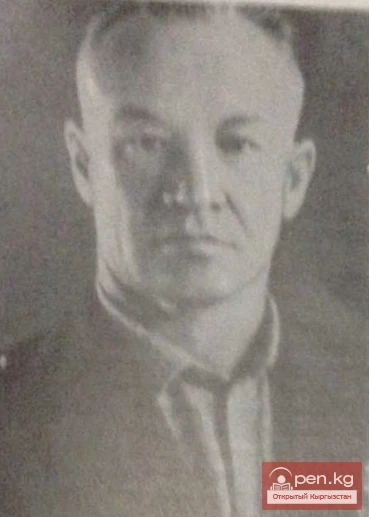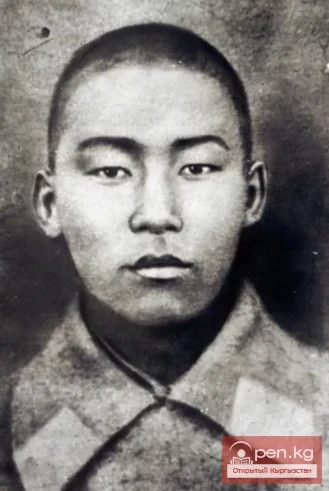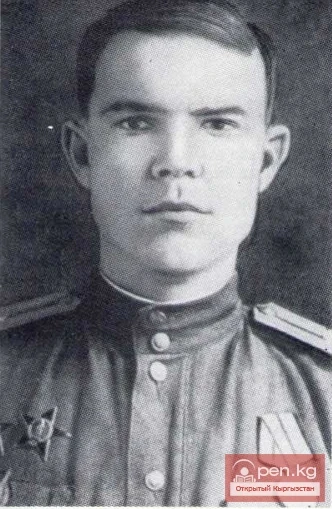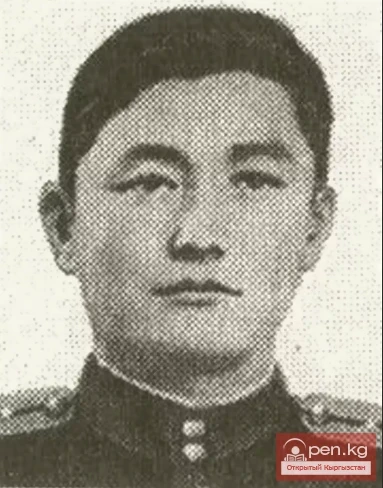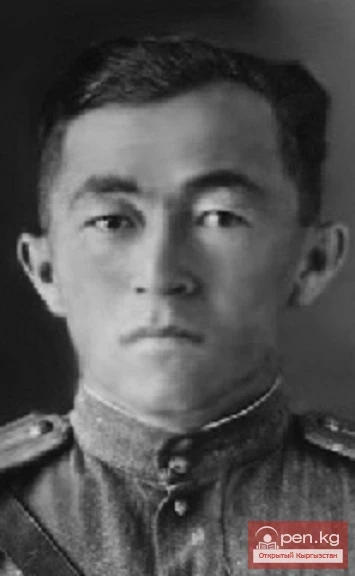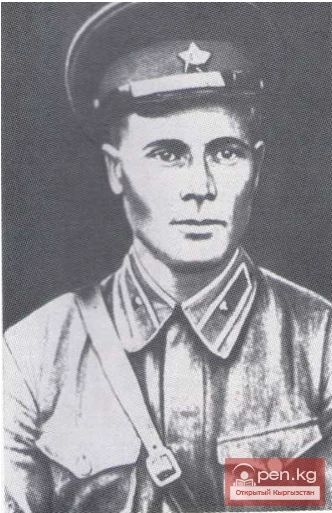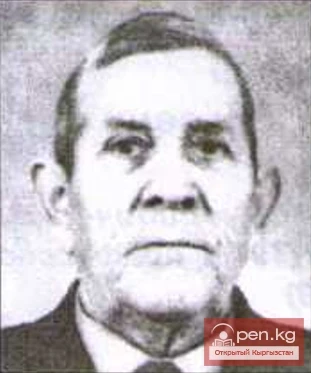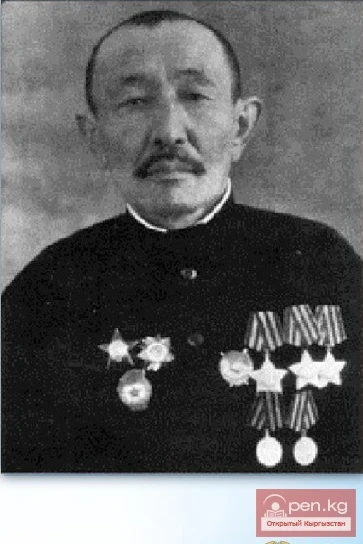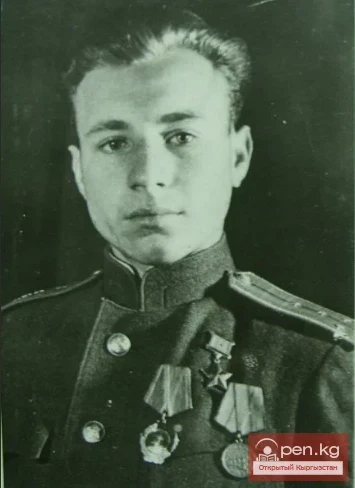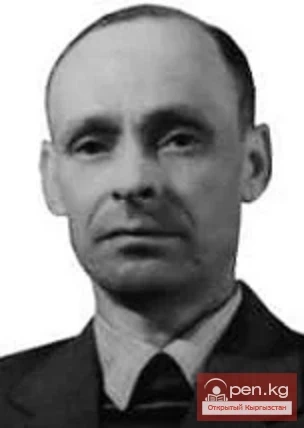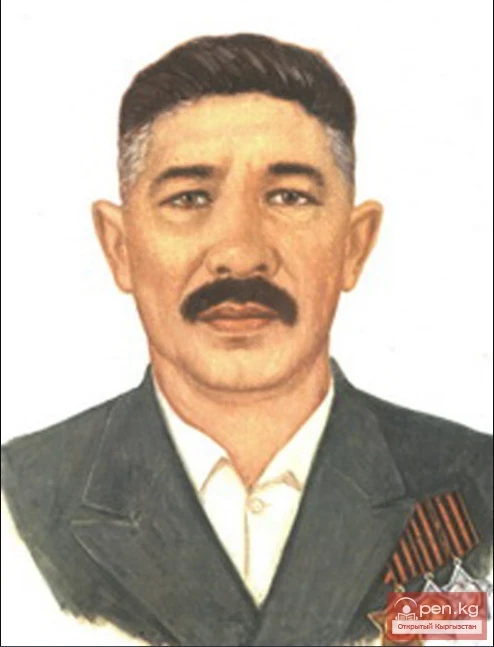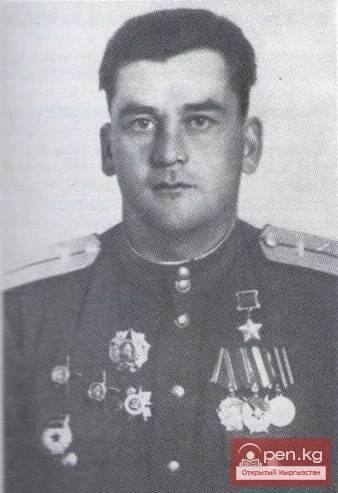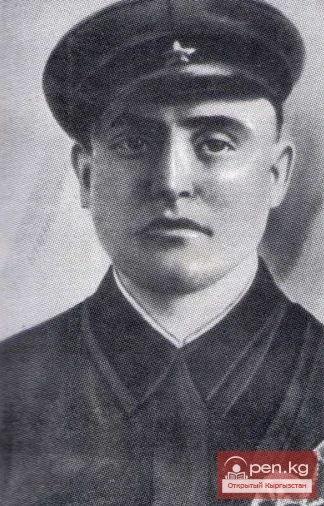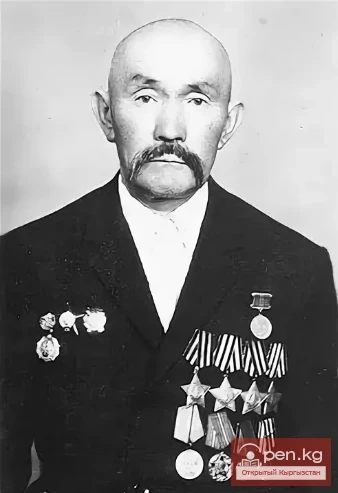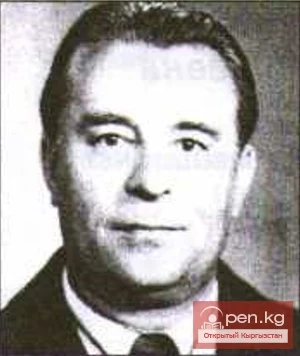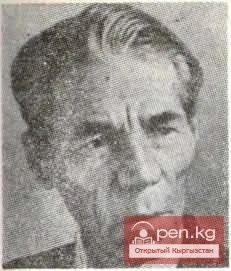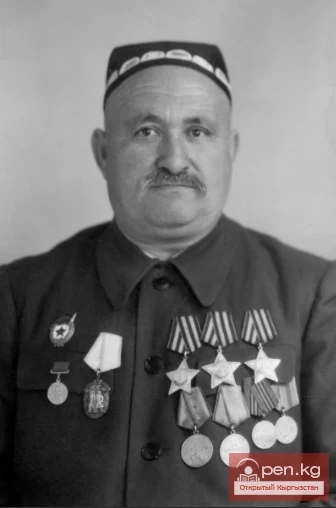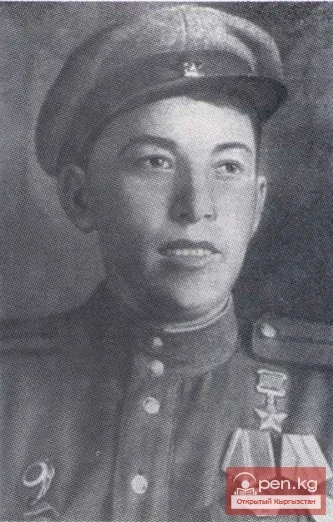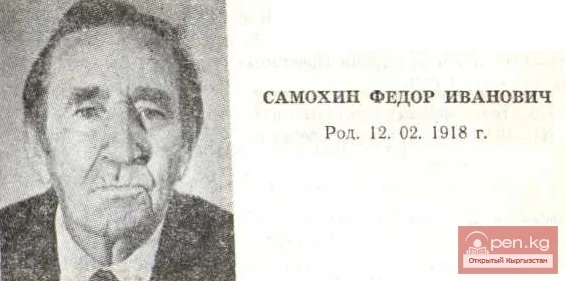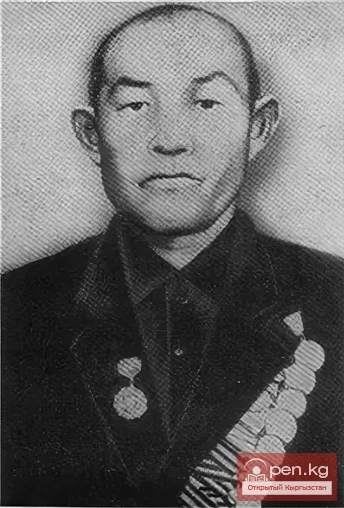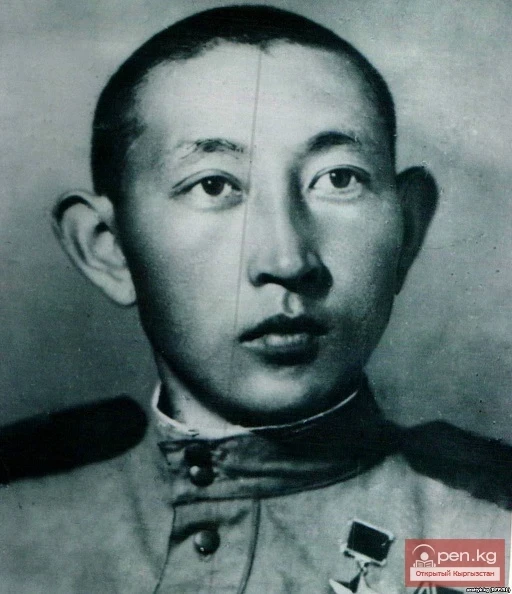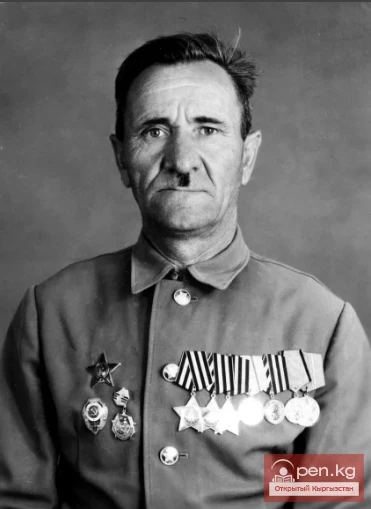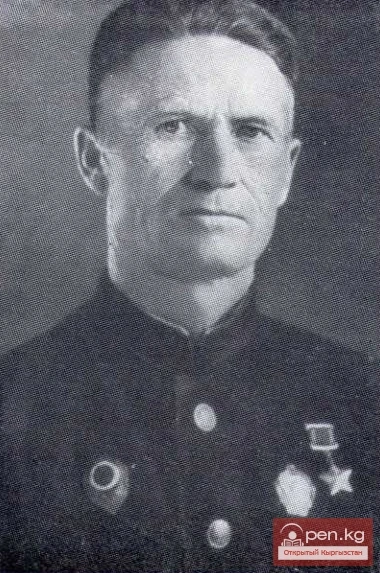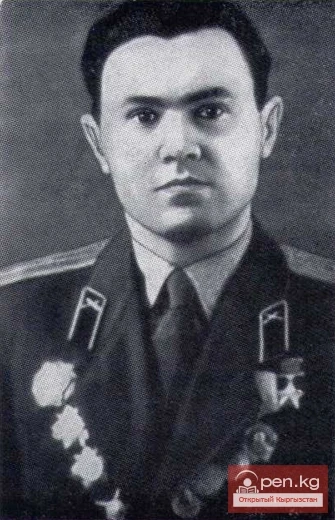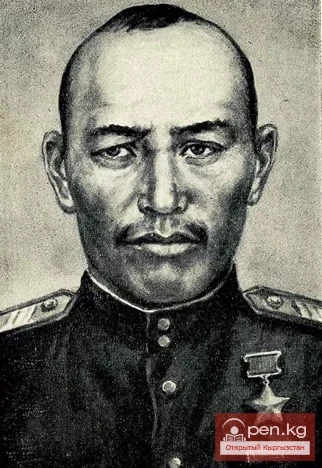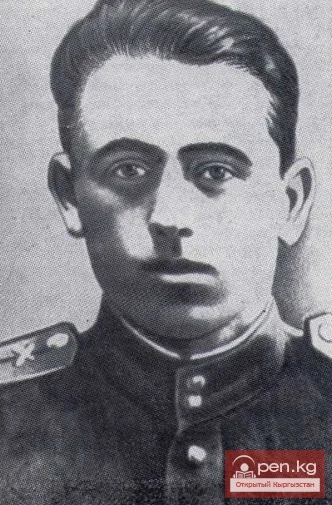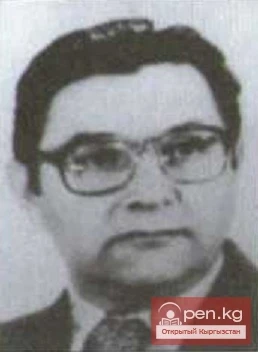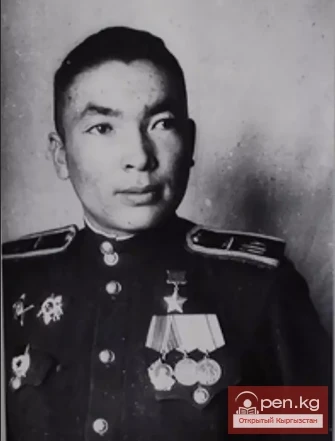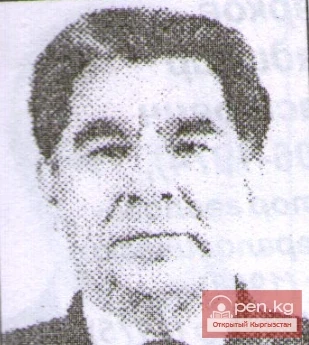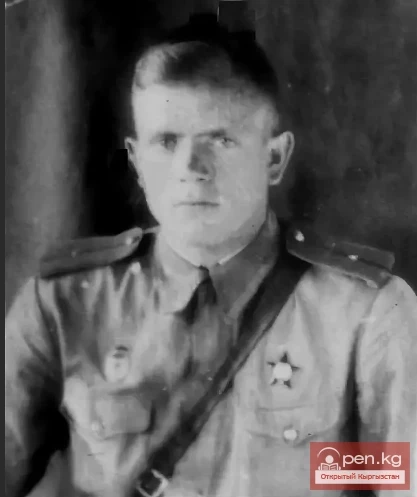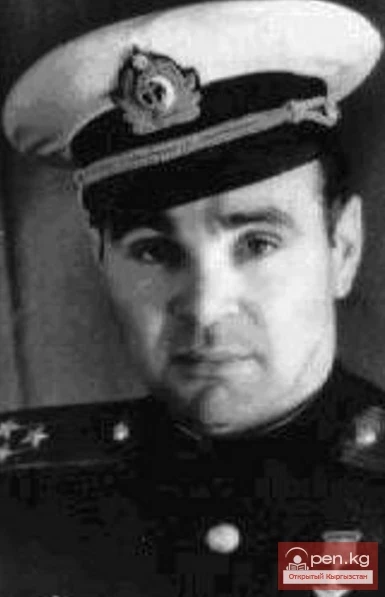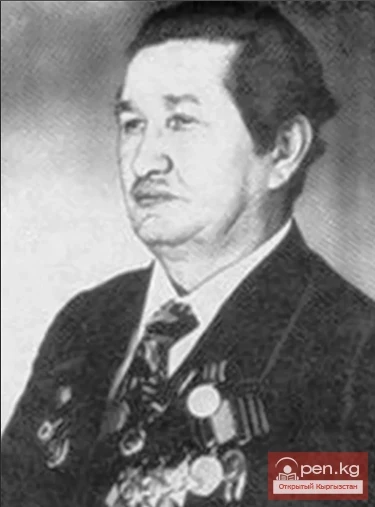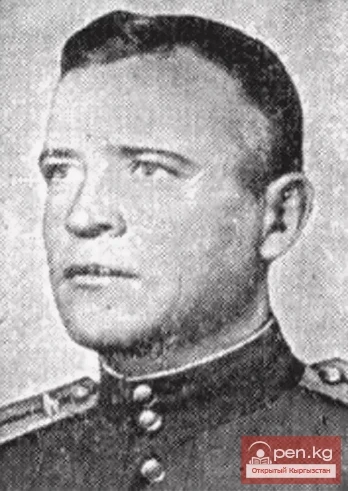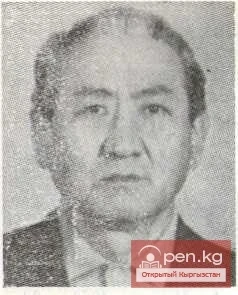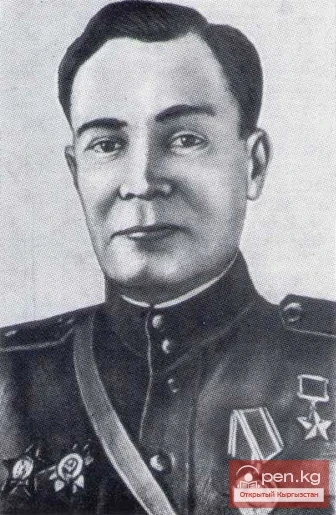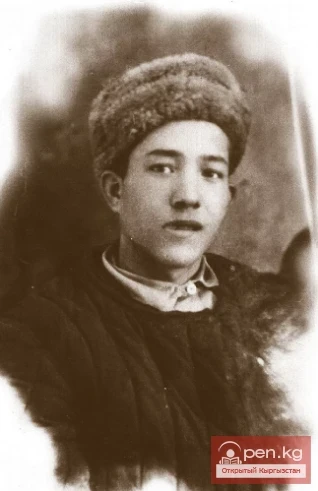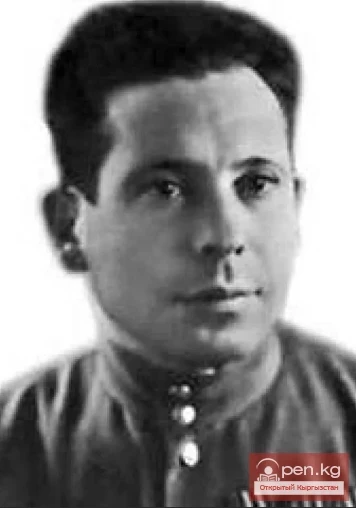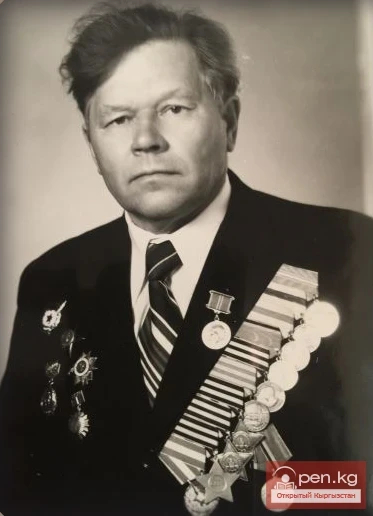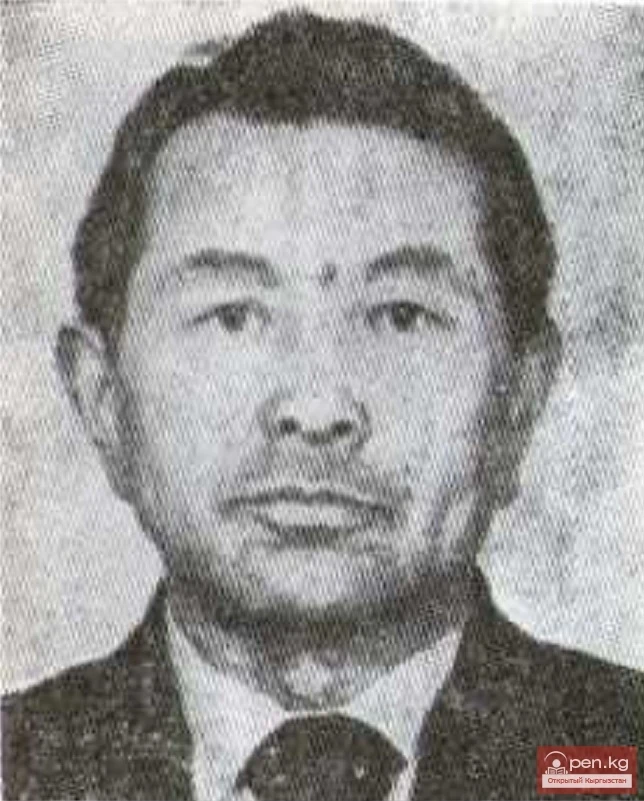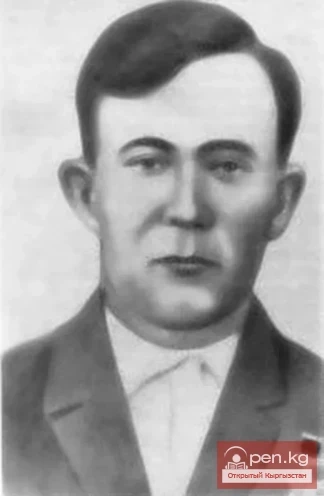
Hero of the Soviet Union Kaykin Vasily Matveyevich
Vasily Matveyevich Kaykin was born in 1910 in the village of Tyup, Tyup District, Issyk-Kul Region, into a peasant family of modest means. He was Russian. He worked as a tractor driver at the MTS (Machine and Tractor Station). He was drafted into the Soviet Army in 1942. Guard Senior Sergeant. Commander of a machine gun crew.
He participated in battles on the Stalingrad, Central, and 1st Belorussian fronts during the Great Patriotic War. He fought on the Volga, crossed the Dnieper and Vistula rivers. He displayed heroism on the Oder. His combat achievements were recognized by the Motherland with the orders of the Red Star and Glory of the 3rd class.
On February 27, 1945, for his exceptional combat feat, V. M. Kaykin was posthumously awarded the title of Hero of the Soviet Union.
The name of the Hero has been immortalized. In the village of Tyup, a street and a school are named after him, and a bust has been erected.
THE SQUADRON IS HEADING FOR THE ODER
His strong and always cheerful Nyura cried bitterly and inconsolably. Feeling awkward, Vasily alternately squeezed Ivan, Zina, and Maria and grumbled angrily:
— Stop it. I will return. Are they killing everyone there?
But he himself had a lump in his throat.
The incredibly hot sun blazed down unseasonably. Blinding reflections danced on the rippling surface of the bay. A light breeze carried the sharp smell of the harvest from the fields, the dry ripeness of the grain.
On the barge, they finished harvesting and lowered the gangplank.
— S-t-o-o-o-p! — came the clear command of the young lieutenant, cinched in new creaky belts, and it echoed across the lake.
The huge crowd trembled, splitting in two. Throwing their backpacks over their shoulders, the recruits lined up in an uneven row.
The tired gray-haired military commissar opened a folder and said:
— Everyone I name now, step forward. By the decision of the party and Soviet bodies, these comrades are not subject to conscription for now and will continue to work in the national economy.
“Not again,” thought Vasily Matveyevich angrily, and he, resignedly shifting from one foot to the other, saw his wife and children breaking away from the crowd.
“What are you so happy about, you fool? — he looked at her reproachfully. — It’s again looking people in the eye.
See how irreplaceable this Kaykin is!”
He and Nyura didn’t live together for long. Each had a different family life before, and each had a daughter.
They didn’t come together easily. Just as everything settled down, this war, which he couldn’t get to, began.
His family history was similar to many stories of other Russian and Ukrainian settlers. The parents of grandfather Matvey came from the Volga region. The entire camp almost died out from a terrible epidemic. Three-year-old Matvey was picked up by kind-hearted strangers, who chose the village of Tyup for permanent residence, raised him as their own son, and helped him start a family.
Vasily was born in 1910. He grew up lively and nimble, loving all kinds of wrestling competitions.
In 1934, as a shock worker, he was sent by the decision of the agricultural artel to the village of Sukhoi Khrebet for tractor driver courses. Until 1937, Vasily Matveyevich worked at the Tyup MTS on a heavy caterpillar tractor ChTZ, and after that, until the war, he headed a tractor and field brigade in the collective farm "Lenin's Path," which is now part of the award-winning giant collective farm "50 Years of the USSR."
On the second day of the war, Vasily Matveyevich submitted an application to the district military enlistment office. There was no response for a long time, so he went again. He argued and proved with the same peasant persistence he used while working on the tractor, and they yielded to him, issuing a summons. And at the dock, before boarding the barge, just like now, he was called out of the general line and ordered to return.
At that time, he somehow endured such treatment — the harvest was in full swing, but now the harvest is almost over...
On the way home, Nyura reassured him, hiding her face in her apron:
— You’ll have your turn, my dear! You’ll have your turn, you’ll have time to twist your head! It’s the restless ones who get twisted first.
He was finally called up only in January 1942, being sent back twice from the assembly points. On a frosty morning, he was sent to Dushanbe, to the cavalry school for junior commanders, from where he, a self-loving mechanizer, humorously wrote home about the horses: “Not ChTZ, of course, but still alive.”
He received his combat baptism on the Stalingrad front, becoming a participant in a cavalry raid behind enemy lines.
The raid ended successfully, but towards the end, the squadron fell into a tight encirclement and was forced to retreat into a dense, impenetrable floodplain. For several days, they made their way through the reeds, feeding only on horse meat, and then, having found a weak spot in the enemy's defense, they struck with all their might and at night, almost without losses, broke through to their own.
The success of this breakthrough was largely ensured by Vasily Matveyevich Kaykin, who, having lost his horse, joined the machine gunners and skillfully covered the attacking group with fire. For his courage and resourcefulness, the commander awarded him a gold watch.
The path of the 54th Cavalry Regiment of the 14th Guards Mozir Order of Suvorov Cavalry Division to our state border was long and difficult. During this time, the chest of the commander of the machine gun crew, Senior Sergeant Vasily Matveyevich Kaykin, was adorned with combat awards. His military feats were recognized with two Orders of Glory of the 3rd class, the Order of the Red Star, and several medals. In January 1945, the 54th Cavalry Regiment of Major Vasilenko entered German territory.
In one of the broadcasts of the Central Radio, titled “They Were Twenty,” the chairman of the collective farm from Turkmenistan, Hero of the Soviet Union Vayram Durdyyev, spoke about the squadron of Senior Lieutenant Kaskov, recalling an episode when they, making a hidden rapid dash behind the front line, caught one of the large enemy units by surprise and captured several important officials, including three generals. Paying tribute to the cavalrymen, he spoke especially warmly of the machine gun crew of Vasily Kaykin, who selflessly covered their retreat and held back the furious enemy for a long time.
— He was a man of exceptional courage,— recounts former commander of the machine gun platoon and former senior lieutenant, now Major General, Hero of the Soviet Union Nikolai Konstantinovich Shchipanov.
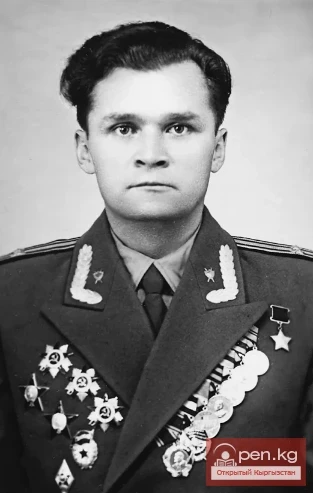
We first met in the Donetsk region. In the platoon, the squadron respected the senior sergeant, and soon I appointed him as my deputy.
...In his last battle, which immortalized his name, Vasily Matveyevich Kaykin fought in one of the already familiar raids behind enemy lines beyond the Oder.
It was winter. The river was frozen, which somewhat facilitated its crossing due to the possible speed of the dash, but still, preparations for the operation were thorough. At noon on January 28, the commander of the regiment, Guard Major Vasilenko, invited the commander of the second squadron, Kaskov, and his deputy for political affairs, Guard Major Klimenko, to his office. The conversation was brief. Klimenko and Kaskov were to select the bravest fighters from the squadron for the head assault group and lead this breakthrough unit. Knowing his fighters, Kaskov first named the machine gun platoon of Senior Lieutenant Shchipanov, the machine gun crew of Vasily Kaykin. This platoon was to be the first to rapidly cross the river with machine guns on their saddles, secure themselves on the enemy bank, and cover the crossing of the entire squadron.
— Like any such operation to break through the front line with small forces, the crossing in front of the fascists was risky,— recalls Hero of the Soviet Union, former commander of the 2nd squadron Leonid Alekseevich Kaskov, who now lives in the city of Kyshtym, Chelyabinsk region. — But we were used to such commands and learned to calculate risks. As always, our main weapons remained surprise and momentum.
It was getting dark. A light mist lay over the river. The group moved up to the previously designated hollow and, choosing the moment, galloped out onto the ice in the twilight. The hooves clattered, the parts of disassembled and attached machine guns jingled on the saddles, and small, painfully biting icy fragments flew into their faces. The fascists realized too late, when almost half the way was behind them, and opened hurricane fire from machine guns and rifles.
A wall of mortar and artillery explosions rose.
Not everyone managed to break through this inevitable death. Cavalry horses fell, gasping in their death throes. Fountains of water and ice erupted around, but the horse avalanche rushed forward uncontrollably.
Vasily Kaykin's machine gun crew was one of the first to occupy a favorable position and opened return fire.
Dismounting, the fighters rushed to storm the enemy trenches, engaging in hand-to-hand combat.
The morning of January 29 began with desperate enemy counterattacks. In the first half of the day, five were repelled.
Then three more, almost one after another. After a short break, another one.
“Come on, Vasya, hold on,” encouraged Kaykin's crew, the senior lieutenant Shchipanov, who appeared from time to time. — The main thing is to hold out. Our guys are already ready for the dash.
And this dash happened. By evening, the squadron reached the town of Prittach and cut the highway to Alt-Kessel.
On January 30, significantly advancing against the enemy and capturing the railway station, the squadron took temporary defensive positions.
The only survivor from the machine gun crew in these battles, Yuri Borisovich Kardashenko, Vasily Mikhailovich's inseparable friend and comrade, recounts:
— This was our, so to speak, main mission — to operate behind enemy lines, gathering necessary intelligence for the command and sowing panic among their ranks. We met Vasily Mikhailovich Kaykin back in '43. I remember he received a letter from home. Well, letters can be of all kinds, good ones come, but not so childishly joyful. But then he flew into a rage, grabbed it in a bundle — he was strong, shaking it. And if our Vasily was drawn to fight, it was something out of the ordinary. It turned out to be quite an unusual letter.
His little son went to school and scribbled something...
We couldn’t sleep for a long time that evening.
I had never seen Vasily so talkative before or after...
The squadron hastily dug in along the railway track, but now Vasily Matveyevich Kaykin was not satisfied with his position. Looking around, he suggested to his crew to move out behind the embankment and disguise themselves under the crossing.
The proposal was tempting. Overall approving it, platoon commander Shchipanov warned that in a critical situation, the machine gun crew would find it difficult to count on timely and effective support.
— We’ll hold out, comrade Guard Senior Lieutenant,— said Kaykin. — It’s not our first time.
As soon as they had camouflaged themselves, heavy shells exploded nearby. A self-propelled gun opened fire. The rumble of approaching tanks was heard on the highway from the direction of Grünberg.
The fascists, with forces of up to two battalions, attacked the station and the railway crossing from three sides. The machine gunners opened fire almost at point-blank range, not only stunning the overconfident enemy but immediately inflicting huge losses on him. His battalions mixed and fled.
— Well! Well! — rejoiced the crew commander. — We really roasted them! What a position! Let them try again.
But his joy was short-lived; the enemy desperately needed to retake the railway station and crossing.
Having discovered the well-camouflaged machine gun, the fascists concentrated all their mortar and machine gun fire on it. They brought a self-propelled gun for direct fire.
Their efforts were in vain; the shells could not penetrate the reliable concrete shelter. And then the enemy companies rose to attack again.
It was a fierce battle. The fascists spared no effort to destroy the machine gun crew, while Kaykin, Kardashenko, and Esset Pariev did not want to give up such a favorable and secure position for the entire squadron. Attacks rolled in one after another, and the bodies of the enemies already covered the entire field in front of the crossing.
But Esset Pariev, sent back to the squadron’s position for ammunition, did not return, and the overheated machine gun of Vasily Matveyevich soon fell silent.
— That’s it, Esset didn’t make it,— Yuri Kardashenko sat down next to Vasily in frustration. — What to do? Is it still not too late to retreat to our side of the embankment?
— No way! — Vasily Matveyevich propped himself up on his elbow. — The enemy won’t get that. — And he exhaled after a short pause: — Crawl, Yura!
— I... I won’t make it, Vasily,— the second man was clearly confused, as the enemy’s chains were very close.
— You have to make it,— Kaykin grabbed the remaining grenades and ran out of cover. — You have to, Yura, don’t delay. I’ll hold them off.
Crawling, twisting among the bushes and pressing into the unevenness of the field, he reached a shell hole about fifty meters from their previous, so reliably serving shelter, and kept looking back at his comrade climbing the embankment.
But the fascists noticed Kaykin's maneuver and began to surround him.
Everything that followed happened before the eyes of the squadron.
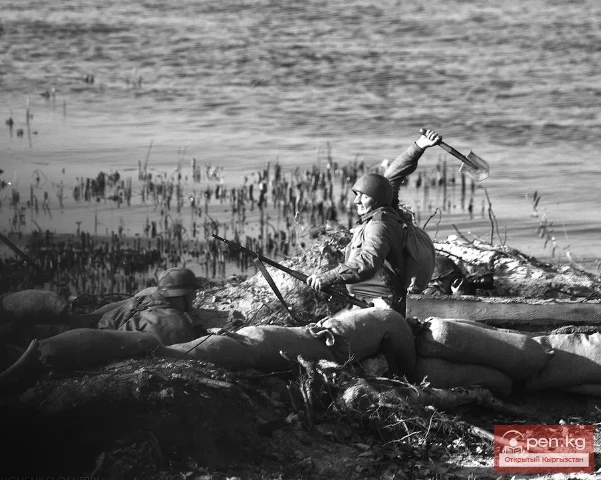
Successfully using the first two grenades but unable to stop the Germans, Vasily rose with the last anti-tank grenade, menacingly raising it above his head. Seven of them immediately pounced on him from different sides.
Blinded by rage, the senior sergeant struck the full weight of this grenade against one of the fascist helmets and pulled the pin...
Overcoming the pain in his wounded leg, the second man returned to the machine gun. Next to him, Senior Lieutenant Shchipanov was rolling down the embankment.
The machine gun fired sharply and vengefully, and panic and madness seized the enemy again. His ranks mixed and trembled.
In signing the award sheet, the commanders of the 54th Guards Cavalry Regiment, Major Vasilenko, and the 14th Guards Mozir Order of Suvorov Division, Guards Major General Lev, commander of the 7th Guards Red Banner Cavalry Corps, Lieutenant General Konstantinov noted: “The machine gun crew of Vasily Matveyevich Kaykin set fire to seven vehicles with ammunition and fuel, destroyed up to a hundred Germans... Senior Sergeant Kaykin Vasily Matveyevich is worthy of the title of Hero of the Soviet Union.”
Twenty-seven days after this heroic death, a decree was issued by the Presidium of the Supreme Soviet of the USSR...
Large, wrinkled hands of a woman, as white as a moon, carefully smooth out the yellowed soldier's triangles. Written in chemical pencil on them: village Tyup, Kyrgyz SSR, Demyan Bedny Street, to Kaykina Anna Ivanovna.
And the return address: field post 35, to Kaykin Vasily Matveyevich.
“Hello, my dear wife Nyura, children Vanya, Zina, Maria. I am happy to inform you that I am alive and well...”
For us, this is a voice from the past, but for the woman, the soldier's widow, it is eternally alive. This is her past, present, and future.
“...Take care of yourself and the children. When I return, we will live differently...”
He believed in the triumph of life, he believed in victory.
